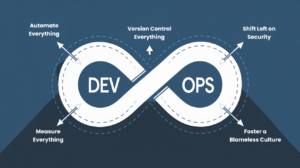A Complete Guide to DevOps Implementation and Metrics

The technology sector advances rapidly, so businesses must expand their speed to retain their market position. The modern business environment demands quick delivery of software products through collaboration while meeting continuous scheduling requirements, which makes DevOps an absolute must. The pressure for faster software delivery has been increasing against organizations, so companies utilize DevOps as their cultural and technical framework for success. Implementing devops managed services creates an extensive solution for companies needing fast growth and reliable software delivery while fixing gaps between development and IT operations. The operational implementations provided by these services enable teams to create automated processes and enhance software deployment timing and minimize maintenance interruptions which drives competitive performance.
Organizations need to learn effective implementation of DevOps along with measurement methods to succeed. This article offers step-by-step explanations about implementing DevOps while illustrating essential KPIs that matter most to its success.
What Are DevOps Managed Services?
DevOps establishes both cultural and procedural standards that integrate development teams with operations units to work together efficiently. DevOps managed services create an even more advanced system than traditional DevOps practices. Under their management, these services handle a complete DevOps solution through development strategy execution and automated deployment alongside continuous monitoring until sustained organizational management. These services supply organizations with the system components combined with expert guidance and a core framework needed to execute DevOps effectively despite the challenges of starting from basic development.
A DevOps consulting company brings its expertise as an integral part of your operation. As part of your organization, they will direct DevOps best practices throughout your software development lifecycle to satisfy individual business requirements and technical infrastructure needs. Through partnering, you can achieve an optimized delivery pipeline alongside continuous development of both infrastructure and delivery practices.
Typical services include:
- Infrastructure automation
- CI/CD pipeline design and maintenance
- Configuration management
- Monitoring and logging solutions
- Cloud resource optimization
- Security and compliance integration
The biggest advantage? Internal teams can concentrate on excellent product development by having an outside DevOps partner who provides scalability, together with system reliability and security to match your business expansion.
Why DevOps Matters More Than Ever

Software elements constitute the entire business structure. Companies face substantial pressure to speed up their deliveries while repairing system issues fast and deploying new functionalities without interruptions. Copyright-based divisions between developers and operations personnel no longer produce efficient results in today’s business environment. Business entities endure financial expenses along with damage to their reputation from system delays along with communication errors, and failed deployments.
DevOps breaks down these silos. Through DevOps, organizations support development and operations teams to collaborate over the entire software development period. DevOps managed services enable companies to avoid developing their solutions from scratch. Your business can use business-targeted automation tools and workflows, and tested development practices to achieve its goals.
The Phases of DevOps Implementation
An implementation of DevOps follows an ongoing progression instead of occurring as a single project. The following are the typical stages of a DevOps implementation framework:
1. Assessment and Planning
Your initial step should analyze all current workflows together with the present IT infrastructure and work environment culture. Identify bottlenecks and inefficiencies. The reliable DevOps consulting company conducts your current state audit before developing a business-specific roadmap.
2. Toolchain Selection
Each DevOps toolchain implementation framework between companies features different features. Organizations usually select Git as a version control system, although they also choose between Jenkins or GitLab CI for continuous integration, while container orchestration requires Docker and Kubernetes, and Prometheus or Grafana fulfill monitoring requirements. Choosing integration-friendly tools designed for the skills your team possesses is the key success factor.
3. Infrastructure as Code (IaC)
Modern provisioning activities replaced traditional manual operations. Your infrastructure becomes easier to maintain and replicate through infrastructure as code practices enabled by tools such as Terraform and Ansible that allow you to write code definitions for infrastructure setups.
4. Building the DevOps Pipeline
Your DevOps practice achieves its primary function through this step. DevOps pipeline architecture needs to execute automated procedures for building code and running tests, along with deploying new versions. Every new code addition becomes automatically tested and deployed through this method, which operates with predictable reliability. Managed services assist organizations in optimizing their pipelines for efficient deployment routines that prevent any downtime occurrences.
5. Continuous Monitoring and Feedback Loops
The following step involves maintaining performance monitoring activities once your system comes online. You should install monitoring instruments that will let you observe system wellness, together with application measurements, and detect errors. You can use the acquired information to make rapid improvements through continuous development.
DevOps Best Practices for Long-Term Success
A basic implementation of a DevOps pipeline does not guarantee organizational success. The full benefits of DevOps become available only when organizations dedicate themselves to practicing continuous improvement and fulfill their goals for faster delivery, along with system reliability improvements. Excellent implementation of these practices enables a regular pipeline to function as an advanced innovation machine.
Multiple behaviors that define the best DevOps practice need to become part of your current workflows.
Automate Everything
The implementation of automation throughout testing and provisioning, and deployment, and constant monitoring functions reduces human mistakes and improves the speed of delivery. The tool generates substantial development time and guarantees similar results between different testing environments.
Version Control Everything
Source code represents only one aspect of what DevOps embraces. Every deployment script and document, and infrastructure configuration should have version control enabled. The system allows full monitoring and quick restoration options, together with improved team communication since multiple environments become involved.
Shift Left on Security
Security shouldn’t be an afterthought. Security scanning and compliance verification, and vulnerability detection must start their operations at the earliest stages of the software development cycle. The adoption of security measures during the early stages enables the identification of potential risks, which minimizes expensive security issues later during development cycles.
Foster a Blameless Culture
Failure naturally occurs, yet it serves as a chance for everyone to gain knowledge. The workplace should maintain an atmosphere that permits teams to study challenges while abstaining from accusations. The innovative environment, together with release cycle resiliency, emerges because of this approach.
Measure Everything
Your organization cannot succeed without performance tracking because it leads you through the dark. Deployment frequency, together with lead time and change failure rate, offers critical information that creates better development choices and ongoing system improvement possibilities.
A skilled DevOps managed services provider, together with these practices, enables natural application. Your workflows transform daily through feedback integration with expert input to maintain system efficiency and security, and expand scalability.
Key Metrics That Define DevOps Success
A lack of measurement prevents you from enhancing any aspect. The key reason behind tracking correct DevOps metrics stems from their vital importance. These DevOps metrics show the highest significance to your operations:
1. Deployment Frequency
Are new code deployments in production part of your regular cycle? And as the frequency increases, you get better agility results.
2. Lead Time for Changes
The production deployment time starts when developers commit new code to the system. Shorter deadline durations signal that your DevOps system functions at peak operational efficiency.
3. Mean Time to Recovery (MTTR)
Your team requires how much time to fix production failures? The faster, the better.
4. Change Failure Rate
Among all deployments, what percentage results in operational problems? High excellence in testing and review processes reflects itself through low failure rates.
5. Infrastructure Cost Efficiency
Running a DevOps team allows operations to increase productivity without raising infrastructure costs. Regular evaluation of cloud costs will reveal potential ways to minimize expenses.
DevOps consulting companies assist organizations in determining important metrics as well as establishing monitoring dashboards with alert systems to track developments in real-time.
How DevOps Managed Services Add Value
Whether your company requires DevOps managed services or not remains undecided for you. The question exists reasonably because many organizations already conduct DevOps practices. Little fundamental implementation reveals the actual worth of managed services. The essential benefits of DevOps managed services enable both long-term enablement of scalability plus continuous enhancement, assisted by immediate professional guidance throughout critical periods.
The following benefits characterize managed services:
Faster Time to Market
Implementing your DevOps environment becomes simpler by using pre-packaged frameworks together with automation scripts and ready-made modules for reuse. The fast deployment speed, along with better scalability, becomes possible since your product advances naturally.
Expertise on Demand
You can avoid the dedicated employment of a complete DevOps staff. Managed service providers deliver you access to experts who specialize in creating secure and efficient scalable systems.
Custom DevOps Pipelines
All organizations maintain unique workflows while dealing with specific problems and work toward different objectives. Stable DevOps consulting companies create DevOps pipeline infrastructure systems that match your specific business requirements and development methodology.
Proactive Monitoring and Optimization
The constant system application monitoring brought by managed services detects problems that would affect users before they occur. Such preparedness results in extended system availability, together with improved operational performance and minimized expenses.
Focus on Core Business
Your internal team can focus on creating excellent products following DevOps service offloading, which frees them from worrying about DevOps management tasks.
Managed services prove to be much more than mere comfort features since they create a strategic value that maintains your business agility and competitive edge while preparing you for the future.
Choosing the Right DevOps Consulting Company
Different partners possess different levels of worth. Selecting a DevOps consulting firm requires turning to the following aspects:
- The consulting company demonstrates extensive experience helping organizations that match your industry profile
- Expertise in your preferred cloud provider (AWS, Azure, GCP)
- Transparent pricing and deliverables
- The consulting company provides end-to-end development lifecycle support beyond single project involvement
- Commitment to knowledge transfer and internal team enablement
Review their DevOps approach by requesting evidence through case studies and client testimonials, and examples of their current pipelines.
FAQS
1. What are DevOps managed services, and how do they help?
A complete solution for DevOps practice deployment and maintenance becomes available through DevOps managed services. The provided services include infrastructure automation and management of CI/CD pipelines alongside system monitoring and security integration. With their assistance, organizations can achieve faster deployments while minimizing downtime and enabling efficient growth without building a whole DevOps team within their company.
2. How does a DevOps pipeline improve software delivery?
The automated DevOps pipeline speeds up reliable software releases while doing automated code building and testing, and deployment. The DevOps pipeline detects problems early to maintain consistent delivery workflows and thereby minimizes human mistakes while reducing the time needed for market delivery.
3. What are the most important metrics to track in a DevOps implementation?
DevOps performance relies on deployment frequency alongside lead time for changes and three other core metrics that consist of mean time to recovery (MTTR), change failure rate, and infrastructure cost efficiency. DevOps teams utilize these metrics to evaluate performance while spotting operational restrictions and making sustained progress on their practices.
4. How do I choose the right DevOps consulting company?
Select a DevOps consulting company that demonstrates successful project execution along with mastery in your technology stack and directs its efforts toward unique solutions. Partners who deliver ongoing support in addition to productive alignments of your business goals should seek out transparent operations and consistent support.
Wrapping Up
DevOps creation goes beyond new tool selection since organizations must develop a culture that supports collaborative work and automated processes, and continuous development. The main purpose is to develop dual operational strength between developers and operators who deliver quality software at high speed while adjusting to new circumstances. Companies seek DevOps managed services to help them reach the cultural transformation, while the transformation process takes time to develop.
DevOps providers assist businesses in advancing their transformation quickly as they implement automated methods to enhance development processes across the software development lifecycle. Managed services enable organizations to grow their innovativeness while achieving seamless operations, together with lasting improvements in software excellence.
Organizations construct efficient and resilient, and forward-thinking systems when they implement essential DevOps best practices along with meaningful performance metrics for measurement. Faster deployment alone does not achieve all that is necessary, since smarter deployment must occur instead.
The combination of a proper DevOps strategy together with the selection of a suitable DevOps consulting organization generates enduring business results for the smooth operation of lean startups and multi-cloud enterprises. Getting the correct technical partner will accelerate your operations speed while increasing security measures and building technical systems that adapt to business expansion.
Do you like to read more educational content? Read our blogs at Cloudastra Technologies or contact us for business enquiry at Cloudastra Contact Us.
